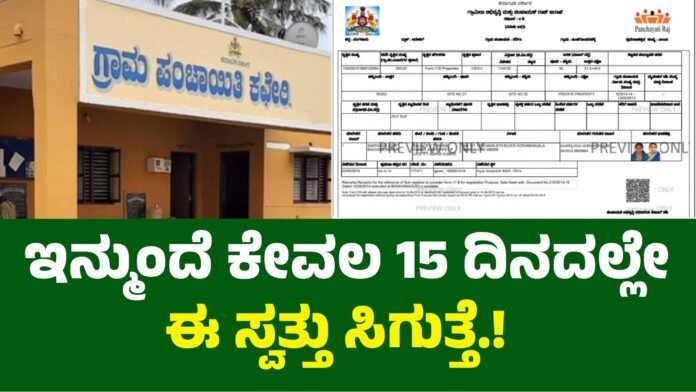E-Swathu Update 2025: Karnataka Government Simplifies Property Certificate Process — Now in Just 15 Days
In a significant step toward digitization and transparency, the Government of Karnataka has introduced a new reform under the E-Swathu digital property management system, making property certificate issuance simpler and faster. According to the latest government notification, all property owners within Gram Panchayat limits will now receive their E-Swathu certificates within just 15 days of application.
This new decision aims to ensure efficiency, reduce delays, and eliminate corruption in local-level land record management.
🌐 What Is the E-Swathu System?
E-Swathu is an online digital property registration and verification platform managed by the Rural Development and Panchayat Raj (RDPR) Department of Karnataka. It helps in:
- Maintaining digital property ownership records
- Issuing B-Khata (property certificate) online
- Tracking tax payments, encumbrances, and land usage
- Preventing fraudulent property transactions
- Promoting transparency in the Panchayat administration
Until now, property owners often had to wait 30–45 days or even longer to receive these certificates. The new update cuts down this timeline drastically to just 15 days, bringing relief to millions of property holders.
🏘️ Government’s New Notification – Key Highlights
| Aspect | Earlier Process | Revised Process (2025) |
|---|---|---|
| Certificate Issue Duration | 45 days | 15 days |
| Responsible Officer | Panchayat Development Officer (PDO) | PDO + Automated approval if delayed |
| Applicable Area | Gram Panchayat limits | All rural properties (non-government land) |
| Approval Mode | Manual | Digital / Auto-approval if PDO fails to act |
Under this new system, if the Panchayat Development Officer (PDO) fails to process the application within 15 days, the system will automatically approve and issue the certificate. This step ensures that citizens no longer face unnecessary delays or harassment in the name of documentation.
🏛️ Legal Framework and Implementation
The reform was made under the Karnataka Gram Swaraj and Panchayat Raj (Amendment) Act, 1993, with digital provisions added for efficient tax collection and property management.
Rural Development and Panchayat Raj Minister Priyank Kharge announced that over 95,75,935 properties across the state will benefit from this reform.
He also stated that new digital upgrades will be implemented in the E-Swathu portal to ensure smooth operation and automatic processing of property certificates.
💡 Why This Update Is Important
This update has several long-term benefits for rural residents:
- ✅ Faster Delivery: Property certificates will now be issued within 15 days.
- ✅ Transparent Process: Automation reduces manual interference and corruption.
- ✅ Convenience for Citizens: Applicants can track their status online without visiting offices repeatedly.
- ✅ Legal Security: Property owners will have verified, tamper-proof digital records.
- ✅ Better Tax Governance: Panchayats can efficiently collect taxes based on verified property data.
🧾 Which Properties Are Eligible?
Only private properties located within the Gram Panchayat jurisdiction will be eligible for E-Swathu certificates.
Not Eligible:
- Government land
- Forest land
- Land under control of public institutions
- Any newly developed properties after the amendment that haven’t received official conversion approval
📋 Documents Required for E-Swathu Property Certificate
Applicants must submit the following documents either online or at their Gram Panchayat office:
- Property Registration Certificate
- Land Grant Order (if applicable)
- Latest Electricity Bill
- Encumbrance Certificate (EC)
- Tax Payment Receipt (before April 2025)
- Land Conversion Order (if applicable)
- Approved Layout Plan (if available)
- Registered Relinquishment Deed (if any)
🔄 Appeal Procedure for Disputes
If a citizen faces issues with property tax assessment, fees, or any related dispute:
- First Appeal: Can be filed with the Assistant Development Officer (Development).
- Second Appeal: Can be escalated to the Chief Executive Officer (CEO) of the Zilla Panchayat.
This ensures a transparent grievance redressal mechanism for all property-related concerns at the local level.
🧠 Digital Empowerment and Future Plans
The state government is also focusing on integrating GIS (Geographic Information System) and satellite mapping into the E-Swathu platform. This will help Panchayats to:
- Accurately identify property boundaries
- Verify land use patterns
- Manage revenue collection digitally
- Provide authenticated digital NOCs (No Objection Certificates)
By digitizing the entire process, Karnataka is moving toward a paperless governance model, enhancing citizen trust and administrative accountability.
🗓️ Timeline and Implementation
The E-Swathu 15-day distribution rule will be implemented across all 6,000+ Gram Panchayats in a phased manner.
- Phase 1: Urban-influenced Gram Panchayats
- Phase 2: Semi-rural and remote Panchayats
All PDOs have been directed to update local databases and assist citizens in completing pending applications within the new time limit.
📞 How to Apply for E-Swathu Certificate
- Visit your nearest Gram Panchayat office or log on to the official E-Swathu portal.
- Submit your property details and required documents.
- Pay the applicable service fee and obtain the acknowledgment.
- Track your application online through the E-Swathu tracking system.
- Receive your digital certificate within 15 working days (automatically approved if delayed).
💬 Public Response
The reform has been welcomed widely by rural citizens, farmers, and property owners. Many have praised the government’s effort to make local governance more efficient and citizen-friendly. Experts believe this digital reform will serve as a model for other Indian states aiming to simplify rural property registration and verification systems.
Apply Link
Conclusion
The Karnataka government’s decision to make E-Swathu certificate delivery within 15 days marks a major milestone in rural e-governance. It bridges the gap between citizens and administration, brings transparency, and speeds up essential property-related services.
As the system evolves, property holders can expect even more digital convenience, faster verification, and reduced dependency on manual procedures — making rural Karnataka a true example of “Smart Panchayat Governance.”


